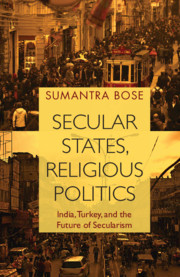Book contents
4 - India: The Anti-Secularist Ascendancy
Published online by Cambridge University Press: 20 October 2018
Summary
The danger to India, mark you, is not Communism. It is Hindu right-wing communalism.
—Jawaharlal Nehru, Prime Minister of India, speaking to officers of the Indian Foreign Service in 1959A wintry day in December 1992 is etched in independent India's history. On 6 December 1992, a disused 464-year-old mosque was razed in northern India by thousands of Hindu nationalist militants in a frenzied assault which lasted several hours. After an initial wave of activists climbed on the mosque's parapets and domes and triumphantly raised saffron flags – saffron being the traditional colour associated with Hinduism – a vast mob from amongst the tens of thousands who had gathered close to the mosque for a show of strength used axes, hammers, grappling hooks and other implements to completely demolish the structure. They had clearly come thoroughly prepared to launch the attack. The site was the small but famous pilgrimage town of Ayodhya, located in the eastern part (purvanchal) of India's most populous State, Uttar Pradesh (Northern Province), which is a gigantic sprawl across the Indo–Gangetic plain.
According to ancient Hindu mythology, Ayodhya is the birthplace of the deity Lord Ram, a prince who is the central character of the Sanskrit epic known as the Ramayana; hence its holy status. The town's mosque was built in 1528 ce by a general of the army of Babur, a warrior of Turkic Central Asian origins who in 1526 founded the subcontinent's Mughal Empire, which lasted for over three centuries until its formal liquidation by British colonial power in 1857. The zenith of Mughal power was from the late sixteenth century – the reign (1556–1605) of the dynasty's greatest monarch Akbar, who combined martial exploits with religious eclecticism, promoting a synthesis of Hinduism and Islam as his court religion – until the late seventeenth century. Thereafter the Empire gradually declined, and from the mid-eighteenth century onward the Mughal monarchy had a largely nominal existence, while the British gradually took over the subcontinent. Babur claimed descent from two previous founders of empires: the Mongol warrior Genghis Khan and the Turkic–Mongol warrior Timur (‘the lame’). Babur wrote a detailed autobiography, the Baburnama, in a hybrid of his native Turkic dialect and Persian; this was published shortly after his death in 1530.
- Type
- Chapter
- Information
- Secular States, Religious PoliticsIndia, Turkey, and the Future of Secularism, pp. 117 - 158Publisher: Cambridge University PressPrint publication year: 2018



